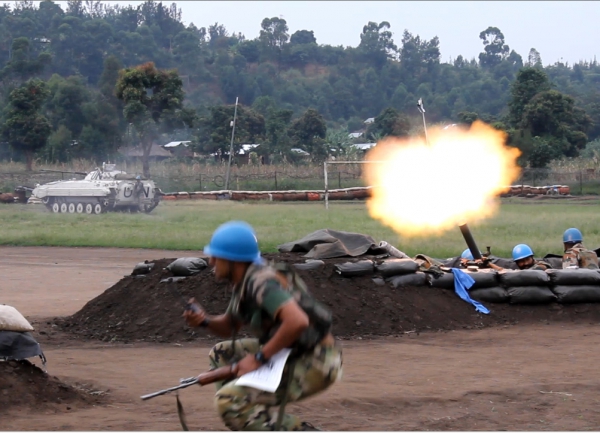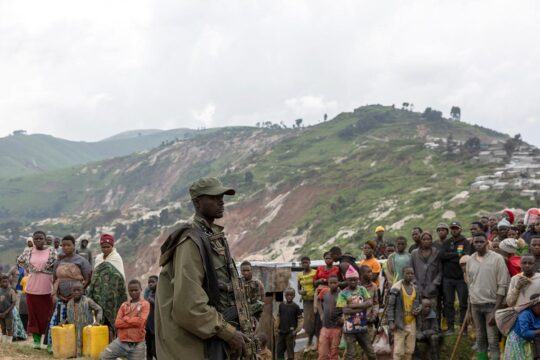After a military defeat in late 2013, the Democratic Republic of Congo’s M23 rebel movement is trying to turn itself into a political party.
The group was formed in May 2012 in North Kivu, an unstable eastern province of the DRC that is rich in mineral resources (gold, coltan, cassiterite). It grew out of two previous armed groups that were mainly Congolese Tutsi: the Congolese Rally for Democracy (RCD, 1998-2003) and the National Congress for Defence of the People (CNDP, 2007-2009), which were supported by Rwanda.
The M23 gets its name from the agreement of March 23, 2009, which granted amnesty to the CNDP and provided for its integration into the army and police. Four years later, former CNDP members deserted and set up the M23. Their complaints included the failure to neutralize Rwandan Hutu forces of the FDLR (Democratic Forces for the Liberation of Rwanda), some of whose leaders fled to eastern DRC after participating in the 1994 genocide against Tutsis in Rwanda.
According to UN experts, the M23 was supported with arms and ammunition by Rwanda and Uganda, two neighbouring countries of the DRC which have always denied these allegations. In November 2013, the M23 was defeated by the Congolese army and the UN Mission (Monusco). The following month in Nairobi, it signed peace declarations with Kinshasa. Implementation has hit problems, mainly on repatriation of former rebels and amnesty.
Repatriation was supposed to apply to about 1,600 combatants exiled in Uganda and some 1,000 others in Rwanda. But according to François Muamba, coordinator of the National Monitoring Mechanism (MNS), there are only 460 in Rwanda. “When you ask where the others are, you are told they are with their families, which would support allegations that not all the ex-M23 fighters are Congolese!” he told JusticeInfo.Net.
In September 2014 the MNS launched a “voluntary” repatriation programme, but only about 200 ex-rebels, mainly in Uganda, took part. So whose fault is this? The MNS accuses the M23 of telling its former fighters to “systematically refuse” to return, whereas the M23 claims the repatriation was “forced” and that returnees risk arrest or execution.
An analyst specializing in conflicts in eastern DRC told JusticeInfo.Net that “lack of will on the part of Rwanda and Uganda” is also hampering repatriation, but that the DRC must also “do more about the FDLR”, which once served as a “rampart” against Rwanda (involved in two wars in the DRC between 1996 and 2003), and against which the fight has been weakened by differences between the Congolese army and Monusco.
Transforming the M23 into a political party
Repatriated former M23 fighters have been put far from Kivu to prevent any military reorganization and, like other rebels who have surrendered, they live in demobilization centres in difficult conditions. Muamba assures us that they are nevertheless being prepared for civilian life with training in agriculture, livestock rearing, masonry, carpentry and sewing. As for the amnesty, it has been granted to some 700 ex-rebels but the M23 thinks all its members should get amnesty. Impossible, says Kinshasa, because the February 11, 2014 law covers certain acts of war and insurrection but not war crimes, crimes against humanity or genocide. The UN accuses the M23 of murders, rapes, looting and recruitment of child soldiers, and has slapped sanctions on it in the form of asset freezes and travel bans.
After threatening in October to pull out of the agreements, the M23 asked the International Conference on the Great Lakes Region (ICGLR), which is mediating in the crisis, to “facilitate a meeting between the two sides”. This came as an assessment meeting was due to take place in Kinshasa on Wednesday November 18.
“If they came, that would be excellent news,” says Muamba. “How can we set up the mixed commission if they are not there?” It is hard to know right now if the M23 will send Désiré Rwigema, its new coordinator for monitoring application of the declarations. “We are waiting for the ICGLR to sort out issues related to the security of our delegates,” M23 President Bertrand Bisimwa told JusticeInfo.Net.
Désiré Rwigema replaces René Abandi, who resigned in January and is now in charge of transforming the M23 into a political party, a process the Interior Ministry previously accepted for the RCD and CNDP. It will also have to find possible political alliances, but with whom? It is “too early” to say more, according to Bisimwa, who stresses that “the most important thing is to relaunch the implementation process”.
A Congolese analyst nevertheless told JusticeInfo.Net that the M23 was seeking to “immediately” carve itself a place in elections. The electoral cycle, which is currently paralyzed, is due to end with presidential elections in November 2016. Joseph Kabila, who has been President since 2001 – elected in 2006 and again in 2011 in polls marred by fraud – is theoretically ineligible, but the opposition accuses him of wanting to violate the Constitution.






